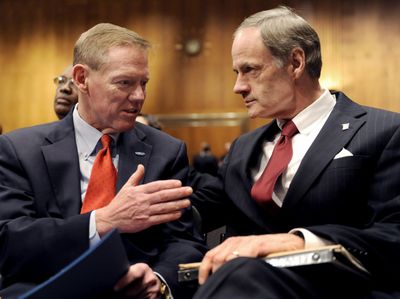Auto chiefs’ pitch fails to get traction in Senate
Bush reluctant to give automakers TARP help

WASHINGTON – The chief executives of Detroit’s automakers returned to Capitol Hill on Thursday bearing austere business plans and a dose of humility, but they failed to close the deal for as much as $38 billion in federal loans.
Lawmakers said they were not convinced that the automakers could return to profitability even with a massive infusion of government cash. That left the once-mighty manufacturers with no clear path to salvation and serious questions about their immediate future. Without a quick rescue, General Motors has said it may not survive through the end of this month.
After a six-hour hearing with the auto executives, Sen. Christopher Dodd, D-Conn., chairman of the Senate Banking Committee, said he would try to assemble a plan to revive the automakers, asserting that “inaction is not an option.” But he could not say what that plan might look like and he conceded that enacting any proposal to save the car companies would be “a tall order.”
Meanwhile, Democratic congressional leaders again urged the Bush administration to use its authority under the $700 billion financial rescue program to forestall the auto industry’s collapse. Dodd said Treasury Secretary Henry Paulson must explain why the car companies, which support one in 10 U.S. jobs, are less deserving of assistance than Wall Street banks and insurance companies.
“If the Federal Reserve and the Treasury Department, under President Bush, can find $30 billion for Bear Stearns, if they can concoct a $150 billion rescue for AIG, if they can commit $250 billion to Fannie Mae and Freddie Mac, and if they can back Citigroup to the tune of more than $300 billion, then there ought to be a way to come up with a far smaller dollar figure to protect this economy from the unintended consequences that would be unleashed by a collapse of the automobile industry,” Dodd said.
Paulson, who was in China, and Federal Reserve Chairman Ben Bernanke both rebuffed invitations to appear at Thursday’s hearing, Dodd said.
In testimony, Gene Dodaro, acting comptroller general of the Government Accountability Office, said the financial rescue program is “worded broadly enough” to permit Paulson to help the automakers. Several Republicans on the panel agreed: Paulson “clearly has the authority under TARP to do this,” said Sen. Bob Corker, R-Tenn., using the acronym for the Troubled Asset Relief Program. “He could do it in five minutes.”
Though Paulson has said he hopes to avoid the bankruptcy of any of the auto companies, he and other Bush administration officials remain adamant that the bailout funds be reserved exclusively for the financial system.
“Our preference is not to use TARP. We’ve said that over and over,” Commerce Secretary Carlos Gutierrez said in an interview. Still, Gutierrez has been in constant communication with the automakers and met with Chrysler chief Robert Nardelli late Wednesday. “There’s no question that there’s a heightened sense of focus and intensity coming into these meetings,” Gutierrez said.
The chief executives of GM, Chrysler and Ford, along with the president of the United Auto Workers, are scheduled to appear again today before the House Financial Services Committee.